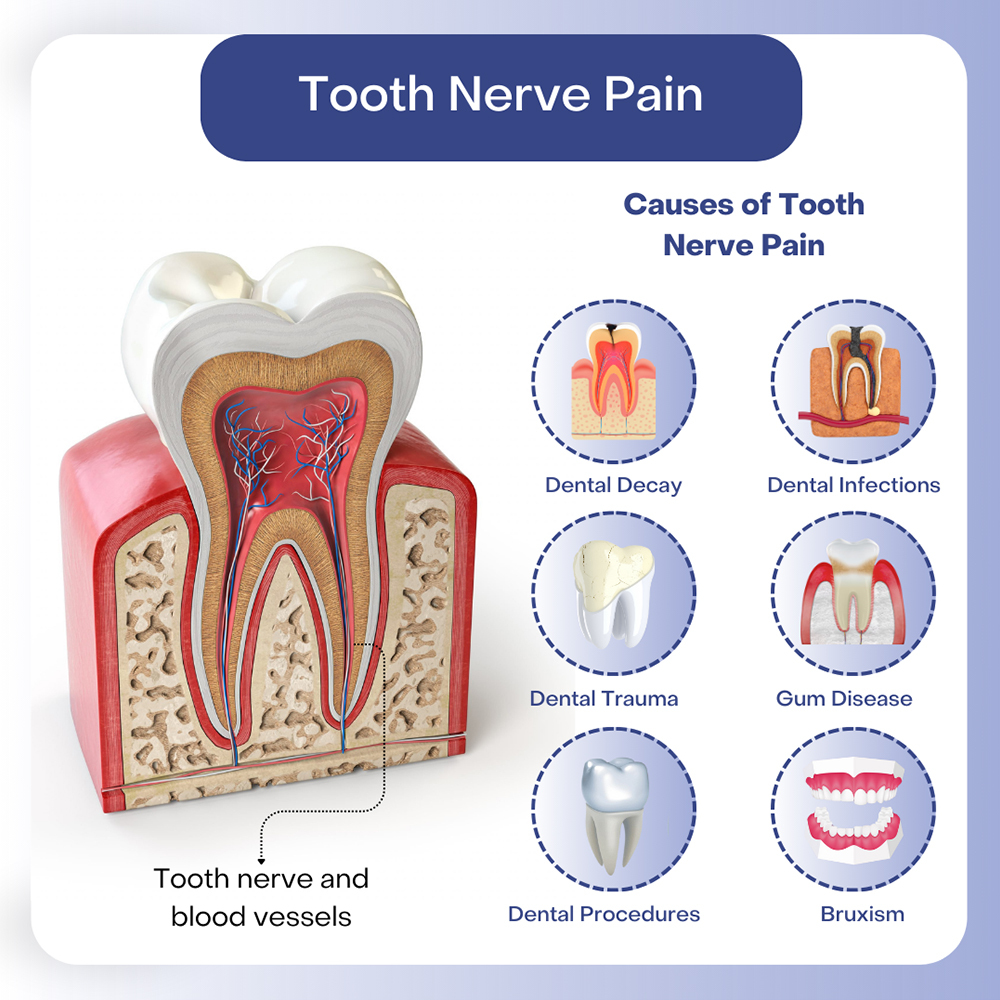Table of contents
In this article, we will explain the following:
 There are several reasons why a tooth can start to feel painful.
There are several reasons why a tooth can start to feel painful.
Each tooth has a bundle of nerves in its center, in the dental pulp. If an individual tooth feels painful, there may be a problem with its dental pulp. A dental pulp can become infected and inflamed if a tooth is damaged.
Tooth nerve pain may occur in the following situations:
Other reasons include:
When a tooth feels sensitive or painful, several procedures can help solve this problem. The treatment recommended will depend on our dentist’s diagnosis. When you come to see us, we can gently examine the tooth to determine the cause of your tooth nerve pain.
The most common treatments provided are dental fillings, root canal therapy, and treatment for conditions like teeth grinding and clenching. We will only recommend tooth extraction when necessary.
Often, tooth nerve pain is caused by a cavity and can be relieved by placing a simple filling. Our dentist can replace any decayed tooth structure with a suitable filling material like tooth-colored composite resin.
We can place a glass ionomer filling if the tooth root is exposed and decayed. This special material gradually releases fluoride, helping protect the tooth and eliminate sensitivity and pain.
Once the tooth settles down after treatment, it should feel far more comfortable.
If the tooth nerve has become infected or inflamed, we must remove it. During treatment, all the dental pulp tissue is removed, and the inner part of your tooth is thoroughly cleaned, disinfected, and permanently sealed. Afterward, a dental crown is placed to protect the tooth.
An adult tooth does not need the tooth nerve to function properly, and root canal therapy can effectively cure some forms of tooth nerve pain.
If you have been clenching and grinding your teeth (bruxism), our dentist will prescribe a custom-made night splint to protect your teeth against further damage during sleep. You may still need other treatments, such as dental fillings or root canal therapy, to restore teeth damaged by bruxism.
Tooth nerve pain can sometimes be due to a severely damaged tooth, and where we cannot repair and restore it. If this is the case, we will explain why a tooth extraction is necessary and discuss how you can replace the tooth later.
We try to see people experiencing dental pain quickly, preferably on the same day. When you contact our dental office, we will schedule an appointment with our dentist, but in the meantime, there are home remedies you can try to relieve sensitivities. These include over-the-counter pain relief and warm saltwater rinses to soothe the tooth.
Maintaining healthy and strong tooth enamel can help prevent tooth nerve pain. Ensure you follow a good daily oral care routine and visit us regularly for checkups and professional dental cleanings.
Ask us about using products designed for sensitive teeth and gums or that can help protect your tooth enamel. Some toothpastes are specifically designed for this purpose, and we can discuss which might be best for your needs.
If you are considering tooth whitening and already have sensitive teeth or tooth nerve pain, please talk to us first. Teeth whitening is a procedure that can cause sensitivity, but professional whitening treatments can reduce this risk.
Healthy, strong teeth should not feel painful, so if one or more of your teeth have started to twinge uncomfortably, please get in touch with us. Often, the cause and treatment needed are straightforward and quick to provide. Leaving it untreated could allow any problems to worsen, increasing your risk of more severe dental pain or tooth loss.

My name is Victoria Kushensky. I am a general dentist dedicated to remaining at the forefront of my field. Combining compassionate care with extensive knowledge, I offer cosmetic and general dentistry services as well as advanced root canal treatments.
I earned my Doctor of Dental Surgery (DDS) degree from the esteemed New York University College of Dentistry. Throughout my career, I have honed my skills in various dental procedures, ensuring effective treatment for each patient’s unique needs. I prioritize patient comfort and understanding, taking the time to thoroughly explain procedures and address any questions.
More about Dr. KushenskyMy NJ Dentist: Victoria Kushensky, DDS
385 Prospect Ave Suite 304
Hackensack, NJ 07601
(201) 298-8000